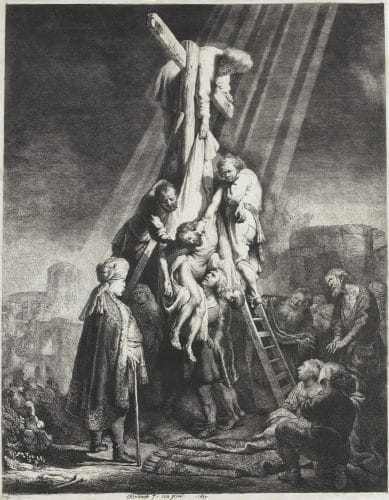The one Easter character we never think about
Why the actions of Joseph of Arimathea pose questions for us all. By Chris Goswami

Dig beneath the surface of the Easter story and you will find one or two intriguing but little-known characters. They are not given much space in our Bible, even less in our Easter sermons and studies. Truth be told, we can easily get by without thinking about them.
But if you do that, you miss a great story. So let’s stop and consider them briefly now.
The Outer Circle of Jesus’ Followers
In this outer orbit of followers we see women including Mary of Magdela, one of Jesus’ followers and a witness to his crucifixion. We see Simon of Cyrene, the barely mentioned character who gets pulled out of the crowd and made to carry the cross. We see Nicodemus the secret disciple. And then we have the intriguing Joseph of Arimathea. He gets only a few lines of text but features in all four Gospels, Matthew, Mark, Luke and John. All these “minor characters” kept their distance from Jesus (and in the case of the women, would only ever receive brief mentions).
This outer circle of characters is fascinating not least because that’s where you and I might place ourselves had we been present in Jesus’ day. We may not be bold enough to have been actual disciples, to give up everything and just follow Jesus (I’m not), but perhaps we would have felt compelled to shadow this Jesus of Nazareth from a distance. Joseph is an excellent example of a distant yet fascinated follower.

The hymn “Jerusalem” – what Joseph did not do
Joseph is one of those characters about whom there are stories and legends. The most eye-popping one comes from medieval England. The story goes that the wealthy Joseph visited and toured England with his nephew, the young teenage Jesus. Furthermore, after Jesus’ death, Joseph retrieved the Holy Grail – the cup Jesus drank from at the Last Supper – and brought it back to England.
In fact, the famous hymn “Jerusalem” from the poem by William Blake, was inspired by this story of a teenage Jesus walking in England:
And did those feet in ancient time
Walk upon England’s mountains green?
And was the holy Lamb of God
On England’s pleasant pastures seen?
Mercifully, William Blake includes a question mark at the end of each line. This is fortunate because the answer in every case is “No” …. Or at least there is zero evidence that the events in the hymn Jerusalem took place in the UK (or anywhere else for that matter).
But it’s a great story — I love it!
The Gospel Accounts – what Joseph did do
Here is Luke’s account — just a few verses at the end of Chapter 23:
Now there was a man named Joseph, a member of the Council, a good and upright man, who had not consented to their decision and action. He came from the Judean town of Arimathea, and he himself was waiting for the kingdom of God. Going to Pilate, he asked for Jesus’ body. Then he took it down, wrapped it in linen cloth and placed it in a tomb cut in the rock, one in which no one had yet been laid. It was Preparation Day, and the Sabbath was about to begin.
The other three gospels provide further details. John emphasises that Joseph had been a secret disciple “out of fear of the Jews”, and that he did not work alone, but with Nicodemus, Jesus second secret disciple, who only dared visit Jesus by night. Interestingly, Nicodemus was also a member of the ruling Council.
“Affluence and Influence” – what Joseph teaches us
In his recent book Joseph of Arimathea: The Extraordinary Calling of Ordinary People, Kevin Costa draws insights from this man’s life.
Joseph, this secret disciple, “outs himself”, comes clean as a disciple, and argues against the ruling Council’s decision to condemn Jesus. He breaks rank with peers and friends, takes courage and speaks in defence of Jesus and against the charges of blasphemy. Of course the Council overrule him, but he then teams up with his colleague Nicodemus to do the one last thing they can do: ensure a fitting burial for Christ. And they arrange this in Joseph’s own tomb in fact (Joseph was a wealthy man).
Asks Costa: “Was this a partnership of disappointed disciples? Perhaps the shame they both carried from their lack of open witness to Jesus?”. We don’t know, but what we see is that an emboldened Joseph openly approaches Pilate without regard to his standing or reputation and requests the body. Costa again: “How extraordinary that (Joseph) would do this publicly after Jesus was dead. He had nothing to gain and so much to lose”. That’s true, the dead Jesus, as far as they knew, could no longer recognise or thank them, but their colleagues might certainly ridicule them. They did it because it was the right thing to do.
Was this a partnership of disappointed disciples? Perhaps the shame they both carried from their lack of open witness to Jesus?
Isn’t it interesting that the disciples have all fled at this point, but the secret disciples, this outer circle were just emerging, This was their hour!
Costa draws our attention to how, in life, we too must learn to steward both our affluence and our influence. It is clear what good stewardship of our affluence, our wealth, looks like with generosity in giving, or tithing.
But good stewardship of our influence, our reputation among colleagues and friends is much harder. Perhaps it is this willingness to risk our reputation, our status, that differentiates a follower of Jesus from a mere admirer of Jesus? Joseph may have been late to show it, but he took a huge risk with his reputation, his standing.

Descent from the Cross, by Rembrandt van Rijn, 1633 with Nicodemus and Joseph of Arimathaea standing on the ladders
What do we learn from Joseph of Arimathea?
This laying aside of our reputation, risking ridicule and separation from work colleagues, friends or family is a tough call. For many of us it is far more challenging than giving money away.
If you are a leader in a secular organisation
Why has God placed you in such a prominent position? Are you willing to use your influence for good? What does that mean?
If you work in any secular role
Would you break rank with your colleagues and “speak truth to power” at the risk of damaging your reputation?
Doing so may release others who feel the same as you but are also afraid to speak out. Note that this needs sensitivity and intelligence, and we need the right topics or we will be viewed as “the religious nutter”. It might be as simple, as just being completely honest in claiming expenses, not bending the rules when you easily could. Honesty can bring the right kind of attention. Or, more substantially, you might speak up on an issue of justice –whatever that means in your work environment. Justice is a recurring theme in scripture and also a topic non-believers readily relate to.
If your work is at home
This is the most challenging place of all. Speaking the uncomfortable truth, in love to a family member, yet continuing to show love through our actions even when they don’t listen, is tough.
This Easter, as you proceed through the drama of the scripture readings, look out for the minor characters, the footnoted people, the people of the small-print – and see what you can glean!
Chris Goswami is Director of Communications at Openwave Mobility and Associate Minister at Lymm Baptist Church. He is the author of www.7minutes.net, where this reflection first appeared. It is republished with permission.
Images | Shutterstock
Do you have a view? Share your thoughts via our letters' page.
Baptist Times, 31/03/2021